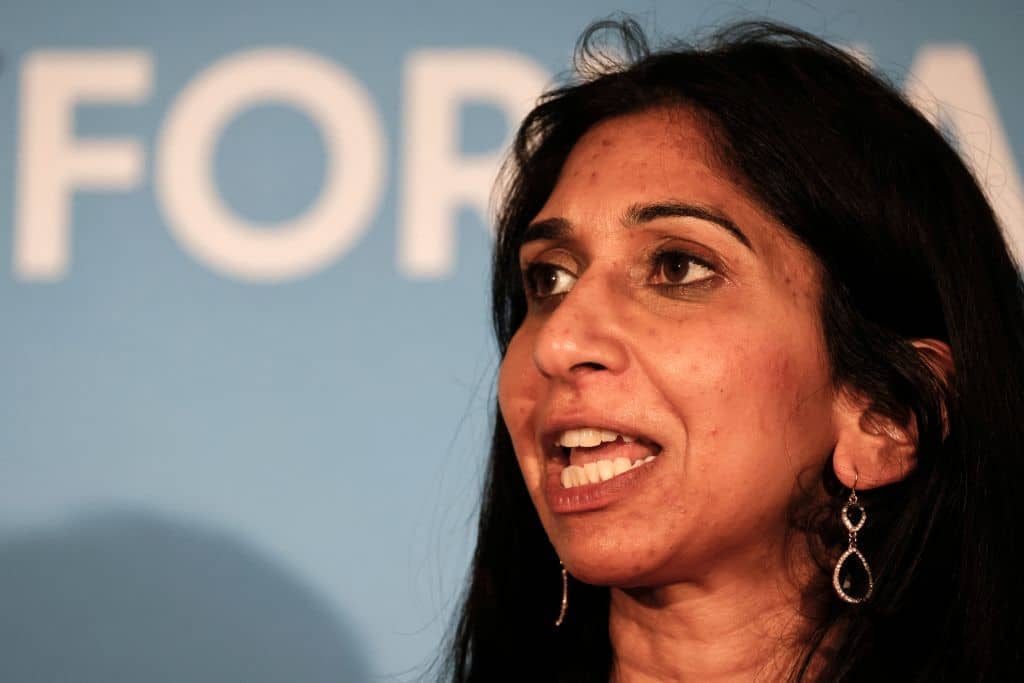Yesterday Suella Braverman unequivocally stated that, as Prime Minister, she would work to withdraw Britain from the European Convention on Human Rights (ECHR). The reaction she encountered on social media was, of course, predictable. To say she was portrayed as a right-wing nut-job, a kind of amalgam of Cruella de Vil and Josiah Bounderby, Dickens’s heartless capitalist in Hard Times, is probably an understatement. As usual in politics, however, there is a bit more to this than meets the eye.
To begin with, Suella has only said directly what other politicians have hinted at before: think Theresa May’s tentative suggestion about exiting the ECHR in 2017, briefly floated and hurriedly withdrawn as too hot to handle. More recently, Dominic Raab’s pointed reference to human rights inflation emanating from the Strasbourg court.
Secondly, Suella is probably right. The case for staying in the ECHR gets more threadbare by the week: many on the right, myself included, think that in the end we will have to withdraw.
There are several reasons for this. The convention is increasingly not the instrument we signed in 1950. At least since the 1990s, the court has taken an activist approach. It has expanded the scope of some human rights beyond recognition – life, protection from inhuman treatment, privacy and equality being prime examples – and put disconcerting limits on others, such as free speech.
Suella Braverman has made this topic what it should be: something at the centre of our political discussions, not suppressed
This upsets the delicate balance on which the ECHR’s acceptability depends, namely that the Strasbourg judges’ moral authority to second-guess elected governments should be carefully limited to extreme infringements of fundamental rights. Increasingly, the Strasbourg court is giving the impression that it is putting duties regarding unfundamental matters of social policy on the state. The result is that the field of democratic politics is being undermined where it properly belongs.
One must now add to this the European Court’s decision to seize the power for itself to give state authorities interim orders without an actual finding of any breach of human rights. This cuts across the function of national courts: a problem put in sharp relief by the Rwanda flight debacle some four weeks ago.
The reasons advanced for remaining, moreover, are correspondingly unconvincing. The fact that we may have helped prepare the convention in the late 1940s is beside the point. It allows us to exit on giving six months’ notice, and, if we think that because of subsequent changes we are better off out of it, it is hard to see any moral compulsion to stay in.
The Good Friday Agreement may require special arrangements of some sort as regards the powers of the Northern Ireland Assembly. But it is difficult to argue this as a reason for continued UK membership, despite frequent assertions from the progressive establishment. Nor, for that matter, is there much reason to think that the freedom in practice enjoyed in a country has much to do with membership of a regional human rights convention like the ECHR. New Zealand, Canada and Australia, numbered 2, 6 and 8 on the Human Freedom Index, are members of no such institution; Azerbaijan and Turkey, numbered 127 and 139, are firmly within the ECHR. Enough said.
But what matters is not simply that the Braverman argument for leaving is uncomfortably strong. That she acted as she did also shows a welcome reverse to a previous tendency among the great and the good to withdraw certain subjects from the political process.
We saw this with Brexit: in about ten years, the idea of leaving the EU moved from being politically unsayable, a view limited to ‘cranks and gadflies’ (the words of Brexiteer Mark Daniel in his book of that name published in 2005), to being not only thinkable but doable. We saw it with race relations. The idea that Britain was an inherently, institutionally racist society was not something any politician cared to argue with, until the Sewell report last year smartly jerked the subject back into the political arena.
Ten years or so ago this was the case with human rights. Any suggestion that the UK should even think of leaving the ECHR was immediately smothered by mainstream politicians. Conservatives, as well as progressives, cheerfully repeated the mantra that Britain should be a beacon for the world on human rights (by which they meant the European convention). What is heartening is that this consensus has now been disrupted.
Two weeks ago Dominic Raab’s Bill of Rights made it clear that Britain was prepared to challenge at least some of the pretensions of the European Court. While it explicitly maintains a commitment to membership and co-operation with the Court, it also implicitly suggests that in future we may look more closely at the justification for giving the court the respect we now do. Suella has merely taken this process one stage further and said the previously unsayable.
The overwhelming likelihood is that, in and of itself, Suella’s jeu d’esprit on human rights will come to little or nothing. So far only she out of all the Tory leadership candidates has stuck her neck out on the issue. Even if she wins (and, with no disrespect to her, she is an outsider whose odds this morning ranged between 25/1 and 50/1), any programme to leave the ECHR will need a long campaign, carefully managed, defended every inch of the way against a very determined opposition indeed.
Suella’s marker is nevertheless important. She has made this topic what it should be: something at the centre of our political discussions, rather than an area where politicians instinctively suppress any questioning of our continued ECHR membership for fear of rocking the boat. For that, whatever happens over the summer, we should be very grateful to her.






Comments